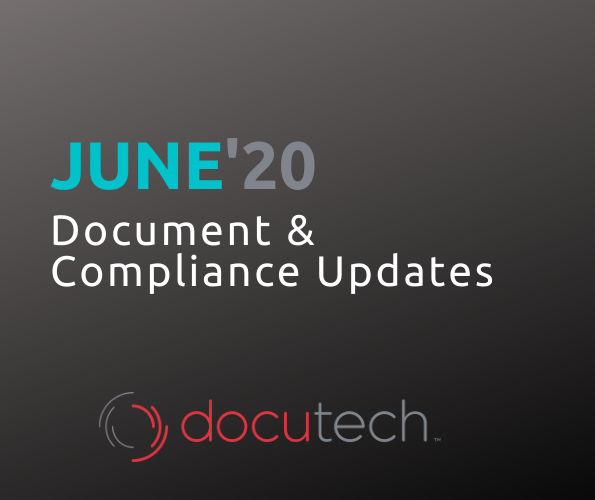- 07.06.20 •
June Compliance Recap: LIBOR Transition FAQ, TRID 2.0 Updates and Document Changes
At the very end of June, the Supreme Court ruled that the CFPB’s single-director structure was unconstitutional. The Court also ruled that the Bureau as an entity was constitutional and could continue operating. In the short term, we don’t expect major changes, but the ruling does permit the President to remove the CFPB’s director “at will,” rather than “for cause.” We’re still processing the potential impact of the ruling, and we will provide more details if needed.
In addition to the Supreme Court decision, June was a busy month on the compliance front, as the CFPB provided impactful guidance regarding the LIBOR transition, a new CHARM booklet, and new TRID FAQ’s. Amendments have also been proposed to Regulation Z.
Our team worked hard to ensure the availability of documents to support clients through these changes. Remember that you can receive compliance-related updates as we publish them by subscribing to our compliance blog.
Fannie Mae Updates: FNMA has changed some of their late charge policies to allow creditors to charge up to 5% (applicable law permitting), rather than requiring them to charge 5% (applicable law permitting). Learn more.
Based on the announcement in FNMA SEL-2020-03, it appears that the GSEs will accept either version of Form 1008 and will not be establishing a mandatory-usage date for their new Form 1008. As a result, we will continue to provide both versions for the foreseeable future, until (and if) the GSEs formally announce that lenders can no longer use the 2009-version. Learn more.
CFPB Provides Clarity on LIBOR Transition and TRID. The CFPB issued a LIBOR Transition FAQ, revised CHARM Booklet, and proposed amendments to Regulation Z. Learn more.
The CFPB also published revisions to their TRID FAQs. They now include information on whether negative prepaid interest should be included in the Total of Payments disclosure on the CD and whether a creditor can require a consumer to sign and return the LE and CD. Learn more.
Mississippi Updates Notarial Laws. On June 25, 2020 Gov. Tate Reeves (R) signed into law MS H.B. 1156 (2020), which enacts a “Revised Mississippi Law on Notarial Acts” and amends or repeals other provisions of Mississippi’s Code (include Miss. Code Ann. § 89-3-7) concerning notarial certificates. Learn more.
Document and Configuration Updates
- Secured Overnight Financing Rate (“SOFR”). Fannie Mae and Freddie Mac have jointly published a LIBOR Transition Playbook and FAQs to help the housing finance industry transition to SOFR. Support has been added to ConformX for the new FNMA/FHLMC SOFR products. Learn more.
- Oklahoma and South Carolina Maximum Late Fee Charge Increases. Oklahoma and South Carolina have updated their laws regarding the maximum dollar amounts which can be charged for late fees. We have updated our ConformX Late Fee Defaults to reflect these changes. Learn more.
- Configuration Change to Explanation of Loan Terms (POA) (Cx23852). In order to prevent any abuses under FNMA LL-2020-03 and FHLMC Bulletin 2020-8, an employee of the attorney-in-fact must explain the terms of the loan to the borrower and confirm that the borrower understands them. Since the acknowledgement does not need to take the form of Cx23852, we are changing the document to Ink Sign by default, to avoid any problems during eSign with Borrowers being forced to eSign a document that many will not need. Learn more.
- CHARM Booklet. The CFPB has published a revised version of the “CHARM Booklet” required by 12 C.F.R. § 1026.19(b)(1). Our Fulfillment operations are now ordering the newest versions of the Booklet and will also provide an electronic version of the Booklet in ConformX and Solex. Learn more.
- Global Mapping Addition: Lower TP5Y/TOP Amount by Including Negative Per Diem Interest (FI 123481). Under TRID 2.0, the CFPB finalized new guidance which held that such negative prepaid interest should be included in the calculation of TIP, which effectively lowers the total amount disclosed. This change was put into Production June 27, 2020. Learn more.
- ID Escrow Account Disclosure (Cx10170). Idaho’s “Mortgage Company Act” is scheduled to be repealed on July 1, 2020. Among the sections of this Act is Idaho Code Ann. § 26-2807, subsection (1) of which requires a mortgage company to “conspicuously and specifically, disclose to each borrower all contractual provisions relating to reserve accounts, impound accounts, escrow accounts, or any other account maintained for the borrower in order to pay for property taxes, property insurance or private mortgage insurance.” Cx10170 is provided for this requirement. Learn more.
- Loan Estimate (Cx18565 & Cx18990) and Closing Disclosure (Cx18566 & Cx18991). To ensure compliance with 12 C.F.R. §§ 1026.37(o)(1)(i) & 38(t)(1)(i) as interpreted by the CFPB (as well as Ibid. § 1026.27, regarding foreign language copies of the LE and CD), we are configuring our standard copies of the LE and CD to print in duplicate. This change will be in Production on July 2, 2020, though clients can test this change in our Stage environments effective immediately. Learn more.
- Program Updates: Late Fee Disclosures and Deferred Payment Loans. Due TRID-requirements concerning the disclosure of late fee charges and how they relate to deferred payment loans, several document, program, and data integrity check changes will take effect on ConformX Production July 2, 2020. They are now available on ConformX Stage for testing. Learn more.
You can always find all the details related to every compliance change and commentary from our industry-leading compliance team on our compliance blog. Subscribe today to stay up to date.

